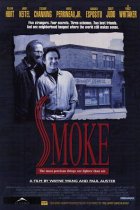
Smoke Page #2
- R
- Year:
- 1995
- 112 min
- 1,040 Views
AUGGIE:
The Queen of England?
PAUL:
Not Elizabeth the Second, Elizabeth the First.
(Pause)
Did you ever hear of Sir Walter Raleigh?
TOMMY:
Sure. He's the guy who threw his cloak down
over the puddle.
JERRY:
I used to smoke Raleigh cigarettes. They came
with a free gift coupon in every pack.
PAUL:
That's the man. Well, Raleigh was the person
who introduced tobacco in England, and since he
was a favorite of the Queen's -- Queen Bess, he
used to call her -- smoking caught on as a
fashion at court. I'm sure Old Bess must have
shared a stogie or two with Sir Walter. Once,
he made a bet with her that he could measure
the weight of smoke.
DENNIS:
You mean, weigh smoke?
PAUL:
Exactly. Weigh smoke.
TOMMY:
You can't do that. It's like weighing air.
PAUL:
I admit it's strange. Almost like weighing
someone's soul. But Sir Walter was a clever
guy. First, he took an unsmoked cigar and put
it on a balance and weighed it. Then he lit up
and smoked the cigar, carefully tapping the
ashes into the balance pan. When he was
finished, he put the butt into the pan along
with the ashes and weighed what was there.
Then he subtracted that number from the
original weight of the unsmoked cigar. The
difference was the weight of the smoke.
TOMMY:
Not bad. That's the kind of guy we need to take
over the Mets.
PAUL:
Oh, he was smart, all right. But not so smart
that he didn't wind up having his head chopped
(Pause)
But that's another story.
AUGGIE:
(Handing PAUL his change and putting
cigar tins and lighter in a paper bag)
Seven eighty-five out of twenty.
Take care of yourself now, and don't do
anything I wouldn't do.
PAUL:
(Smiling)
I wouldn't think of it.
(Waves casually to the OTB MEN)
See you around, fellas.
AUGGIE and the OTB MEN watch as PAUL leaves the store.
TOMMY:
(Turning to AUGGIE)
What is he, some kind of wise guy?
AUGGIE:
Nah. He's a good kid.
JERRY:
I've seen him around. He comes in here a lot,
don't he?
AUGGIE:
Couple of times a week, maybe. He's a writer.
Lives in the neighborhood.
TOMMY:
And what kind of writer is he? An underwriter?
AUGGIE:
(Peeved)
Very funny. Some of the cracks you make. Tommy,
sometimes I think you should see a doctor. You
know, go in for some wit therapy or something.
To clean out the valves in your brain.
TOMMY:
(A little embarrassed. Shrugs)
It was just a joke.
AUGGIE:
The guy's a novelist. Paul Benjamin. You ever
hear of him?
(Pause)
That's a stupid question. The only things you
guys read is the Racing Form and pages of the
Post.
(Pause)
He's published three or four books. But
nothing now for the past few years.
DENNIS:
What's the matter? He run out of ideas?
AUGGIE:
He ran out of luck.
(Pause)
Remember that holdup out here on Seventh Avenue
few years back?
JERRY:
You talking about the bank? The time those two
guys started spraying bullets all over the
street?
AUGGIE:
That's it. Four people got killed. One of them
was Paul's wife.
(Pause)
The poor lug, he hasn't been the same since.
(Pause)
The funny thing was, she stopped in here just
before it happened. To stock up on cigars for
him. She was a nice lady, Ellen. Four or five
months pregnant at the time, which means that
when she was killed, the baby was killed, too.
TOMMY:
Bad day at Black Rock, eh, Auggie?
Close-up of AUGGIE'S face. Remembering.
AUGGIE:
It was bad, all right. I sometimes think that
if she hadn't given me exact change that day,
or if the store had been a little more crowded,
it would have taken her a few more seconds to
get out of here, and then maybe she wouldn't
have stepped in front of that bullet. She'd
still be alive, the baby would have been born,
and Paul would be sitting at home writing
another book instead of wandering the streets
with a hangover.
(Pensive, his expression suddenly
turns to one of alarm)
Cut to white youth in the corner of the store, shoving paperback books
into the pockets of his tattered army fatigue jacket.
AUGGIE (cont'd)
Hey! What are you doing there, kid? Hey, cut
that out!
AUGGIE scrambles out from behind the counter, pushing his way past the
OTB MEN as the kid takes off and runs out of the store.
3.EXT:
DAY. SEVENTH AVENUEAUGGIE chases the BOOK THIEF down the street. Eventually, he gets
winded and gives up. He pauses for a moment to catch his breath, then
turns around and heads back in the direction of the store.
4.INT:
DAY. PAUL'S APARTMENT. A BROWNSTONE BUILDING IN PARK SLOPE(THIRD FLOOR)
Shot of a little brown cigar, burning in an ashtray.
The camera pulls back to reveal PAUL at his desk. He is writing in
longhand, using a pad of yellow legal paper. An old Smith-Corona
typewriter is also on the desk, poised for work with a half-written
page in the roller. Off in the corner, we see a neglected word
processor.
The workroom is a bare and simple place. Desk, chair, and a small
wooden bookcase with manuscripts and papers shoved onto its shelves.
The window faces a brick wall.
As PAUL continues to write, the camera travels from the workroom into
the larger of the two rooms that make up his apartment.
This larger room is an all-purpose space that includes a sleeping area,
a kitchenette in one corner, a dining table and a large easy chair.
Crowded bookshelves occupy one wall from floor to ceiling. The bow
windows face front, looking down onto the street. Near the bed, we see
a framed photograph of a young woman. (This is Ellen, Paul's dead
wife.)
The camera travels back into the workroom. We see PAUL at work. Fade
out.
Fade in. We see PAUL at his desk, eating a TV dinner while still
writing in the pad. After a moment, he inadvertently knocks the food
off the desk with his elbow. He begins to bend over to pick up the
food, but as he does so a new idea suddenly occurs to him. Instead of
cleaning up the mess, he turns back to his pad and continues writing.
5EXT:
DAY. IN FRONT OF THE BROOKLYN CIGAR CO.We see PAUL walking out of the cigar store. JIMMY ROSE is on the
corner, observing him throughout the scene. PAUL takes three or four
steps, then realizes he has forgotten something. He goes back into the
store. During his brief absence, JIMMY remains on the corner, imitating
PAUL'S gestures:
patting in pockets, looking puzzled, realizing that hehas forgotten the cigars he just bought.
PAUL comes out again a moment later, holding a tin of Schimmelpenninck
cigars. He pauses, takes a cigar out of the tin, and lights up. He
continues walking, obviously distracted. He stops briefly at a corner,
then steps out into the street, paying no attention to the traffic. A
speeding tow truck is rushing toward the intersection. At the last
second, a black hand reaches out, grabs PAUL by the arm, and pulls him
back to the curb. If not for that timely move, PAUL would surely have
been run down.
Translation
Translate and read this script in other languages:
Select another language:
- - Select -
- 简体中文 (Chinese - Simplified)
- 繁體中文 (Chinese - Traditional)
- Español (Spanish)
- Esperanto (Esperanto)
- 日本語 (Japanese)
- Português (Portuguese)
- Deutsch (German)
- العربية (Arabic)
- Français (French)
- Русский (Russian)
- ಕನ್ನಡ (Kannada)
- 한국어 (Korean)
- עברית (Hebrew)
- Gaeilge (Irish)
- Українська (Ukrainian)
- اردو (Urdu)
- Magyar (Hungarian)
- मानक हिन्दी (Hindi)
- Indonesia (Indonesian)
- Italiano (Italian)
- தமிழ் (Tamil)
- Türkçe (Turkish)
- తెలుగు (Telugu)
- ภาษาไทย (Thai)
- Tiếng Việt (Vietnamese)
- Čeština (Czech)
- Polski (Polish)
- Bahasa Indonesia (Indonesian)
- Românește (Romanian)
- Nederlands (Dutch)
- Ελληνικά (Greek)
- Latinum (Latin)
- Svenska (Swedish)
- Dansk (Danish)
- Suomi (Finnish)
- فارسی (Persian)
- ייִדיש (Yiddish)
- հայերեն (Armenian)
- Norsk (Norwegian)
- English (English)
Citation
Use the citation below to add this screenplay to your bibliography:
Style:MLAChicagoAPA
"Smoke" Scripts.com. STANDS4 LLC, 2024. Web. 19 Apr. 2024. <https://www.scripts.com/script/smoke_739>.



Discuss this script with the community:
Report Comment
We're doing our best to make sure our content is useful, accurate and safe.
If by any chance you spot an inappropriate comment while navigating through our website please use this form to let us know, and we'll take care of it shortly.
Attachment
You need to be logged in to favorite.
Log In